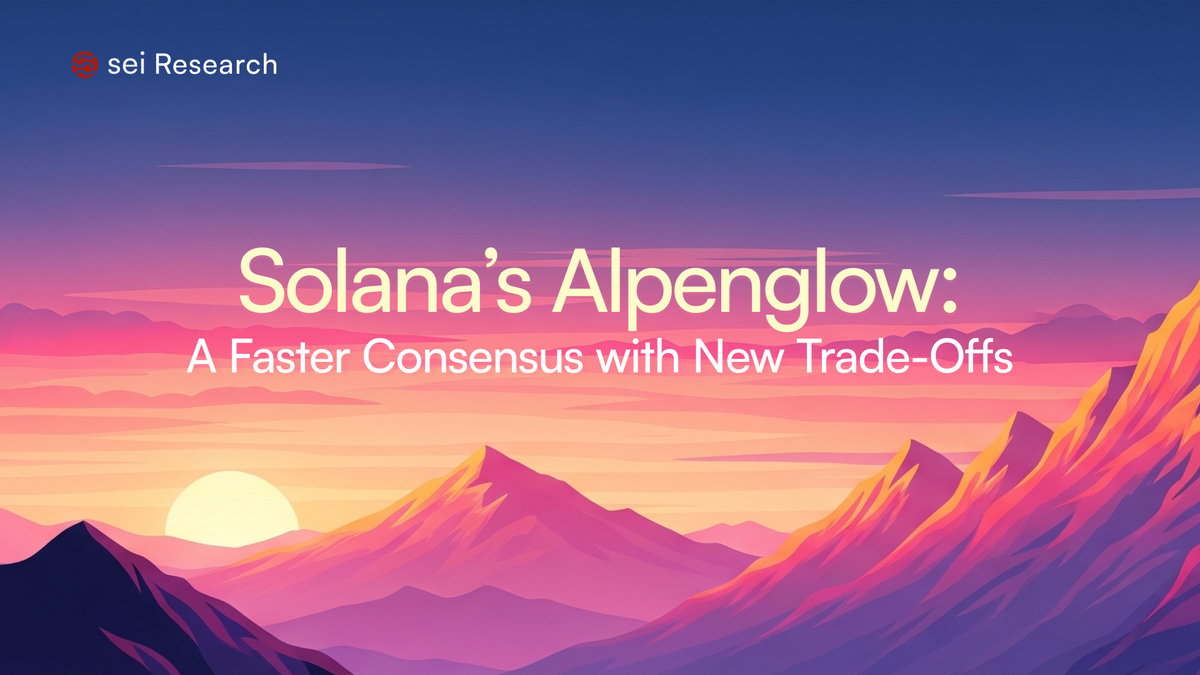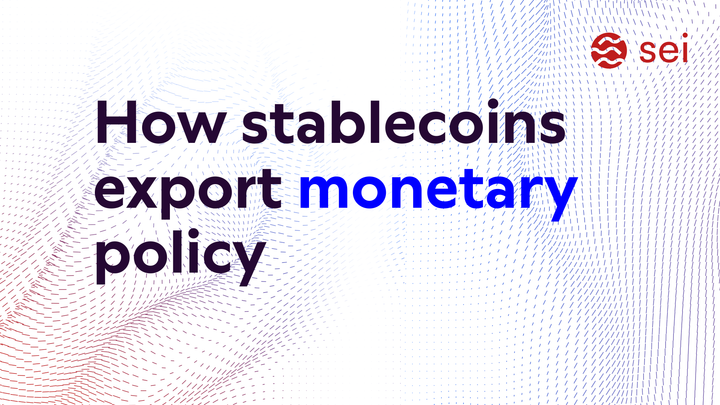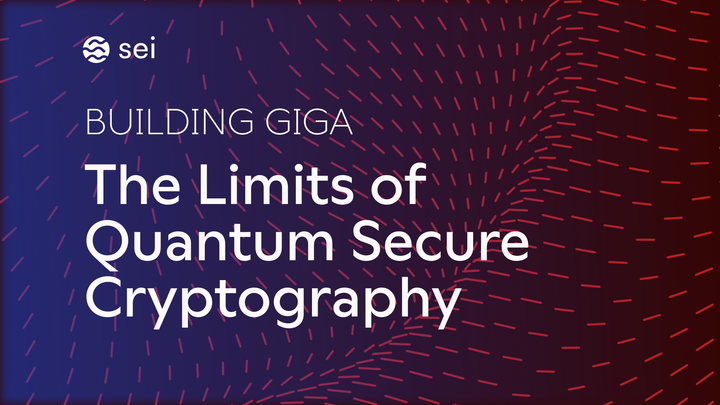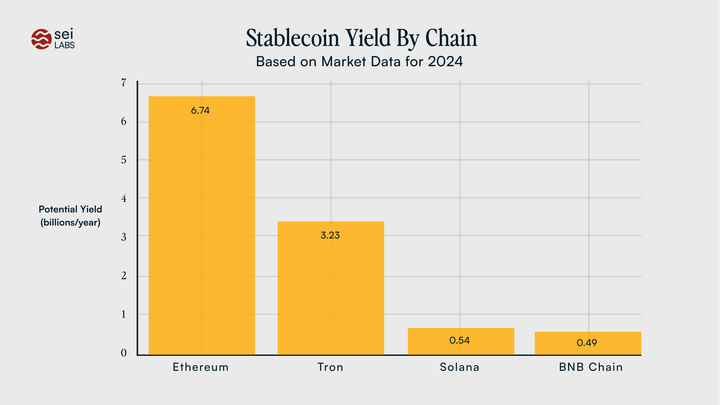Solana’s Alpenglow: A Faster Consensus with New Trade-Offs

By Vangelis, Sei Labs Research for Sei Research Initiative.
Solana's Alpenglow consensus upgrade promises to deliver 100x faster finality. Developed by Anza's research division led by ETH Zurich's Professor Roger Wattenhofer, this upgrade replaces Solana's signature Proof of History and Tower BFT systems with Votor and Rotor components, achieving deterministic finality in 100-150 milliseconds in perfect conditions (real network conditions could be worse) compared to the current 12.8 seconds. It eliminates voting fees that cost validators approximately $60,000 annually (current SOL price), which leads to lower barriers to network participation.
Technical architecture redefines blockchain consensus
Alpenglow's design centers on two core components that work together to improve performance. Votor, the new voting mechanism, implements a dual-path consensus system where blocks can achieve finalization through either a fast path requiring 80% stake approval in a single round, or a slow path requiring 60% approval across two rounds. Both paths run concurrently, with whichever completes first determining block finality.
Its Byzantine fault tolerance model, called "20+20", can tolerate up to 20% adversarial stake attempting malicious behavior plus an additional 20% of offline/unresponsive validators. While this provides a combined 40% fault tolerance that exceeds traditional BFT systems' 33% limit, the trade-offs are nuanced: Alpenglow performs better than traditional BFT when dealing with mixed failure scenarios (combining malicious actors and network issues), but offers weaker protection against purely adversarial attacks where 20%+ of nodes are actively malicious, compared to traditional BFT's 33% pure adversarial tolerance.
Unlike Solana's current Turbine protocol that uses multi-layer tree structures, Rotor implements a flat, single-hop relay system with unified erasure-coded shreds. This reduces network latency while utilizing bandwidth proportionally to validator stake, ensuring optimal network resource utilization without creating bottlenecks.
With BLS signature aggregation, instead of individual validators submitting thousands of separate vote transactions per epoch (costing ~1 SOL daily), validators now broadcast lightweight vote messages to stake-weighted peer sets. Any node can aggregate these signatures into a single certificate using the BLS signature scheme, with only the aggregated certificate header anchored on-chain. However, this approach introduces cryptographic complexity through BLS's stronger security assumptions and potential trusted setup requirements, while questions remain about who bears the cost and provides incentives for nodes to perform the aggregation and submit certificates on-chain.
Replacing Proof of History Simplifies Consensus
PoH served as a cryptographic clock enabling validators to agree on timing without extensive coordination, but this came with complexity costs. The system required pairing with Tower BFT for finalization, created potential hash-stalling vulnerabilities, and introduced coordination delays that limited performance.
Alpenglow replaces this with fixed 400-millisecond block timing, not a globally synchronized clock, but local timeout coordination that eliminates PoH's cryptographic overhead while maintaining timing precision. Leaders operate within four-slot windows lasting 1.6 seconds total, with predetermined timeout deadlines and skip-vote mechanisms for unresponsive leaders, though this introduces classic distributed systems timing challenges without PoH's cryptographic time reference.
The current system requires multiple voting rounds and complex fork choice rules, ultimately taking 12.8 seconds for deterministic finality. Solana attempted to mask this with "optimistic confirmations" providing 500-600 millisecond probabilistic guarantees, but developers still faced uncertainty about transaction permanence.
Votor's binary fork selection, essentially asking "Is this block good or not?", eliminates complex fork choice algorithms while enabling single or dual-round finalization. This simplification doesn't sacrifice security; it enhances it by making the consensus mechanism more predictable and easier to analyze formally.
Alpenglow brings 100-150ms finality that approaches Web2 API response times, making real-time gaming, HFT, and instant payments practically viable. The upgrade delivers security enhancements through its "20+20" fault tolerance model and simplified binary fork selection that eliminates complex attack vectors, while improving decentralization by reducing validator operational costs by 85-90% and lowering the profitability threshold from 4,850 SOL to just 450 SOL.
Developers benefit from simplified consensus mechanics, unified commitment levels that eliminate confusion between confirmed and finalized states, and push-based finality notifications that replace inefficient polling, allowing applications to rely on true finality rather than probabilistic confirmations. Additionally, network stability is enhanced through reduced complexity and formal verification, as the elimination of Proof of History's cryptographic overhead removes potential failure modes while the mathematically proven Votor protocol provides stronger correctness guarantees in most scenarios, though fast-path rollback mechanisms under coordinated Byzantine attacks require further analysis.
Challenges
Single client dependency continues as Agave remains the sole production-ready validator implementation, though Firedancer's expected late-2025 launch should address this concern. Geographic performance variations mean validators in remote locations may struggle to participate in fast-path consensus, potentially creating centralization pressures. The whitepaper also leaves some economic mechanisms unspecified, particularly reward distribution for Rotor relay operations.
Technical community discourse includes thoughtful critiques alongside enthusiasm. Security researchers like Jeff Garzik argue that such speed improvements necessarily involve security trade-offs, noting physical limitations from fiber optic cables spanning oceans. However, these concerns appear to miss Alpenglow's geographic optimization and fault tolerance improvements that address precisely these challenges.
Undefined Validator Economics
The Alpenglow whitepaper and related materials do not fully specify:
The exact mechanisms for rewarding validator voting activity How Rotor relays will be compensated for bandwidth usage How equivocation will be punished (who submits the penalty, how large it is, whether punishment is automatic or governance-driven) These undefined aspects could become points of contention within the ecosystem.
MEV Landscape Restructuring
Alpenglow will fundamentally restructure the current MEV (Maximal Extractable Value) landscape on Solana:
The collapse of the optimistic confirmation window from ~500-600ms to ~150ms could disadvantage independent latency arbitrageurs
Leaders, especially validators with customized block building infrastructure, may capture a larger share of MEV. New, more granular trading systems may need to be developed
RPC Provider Challenges
The operational consequences for RPC providers include potential scalability concerns:
WebSocket Fan-Out Bottleneck: With finality arriving in ~100-150ms, polling
transactions no longer make sense. RPC providers would need to shift to push channels that stay open for the life of apps, broadcasting certificates to every subscribed client. Real-Time Cache Freshness: Any cache that retains account data longer than a quarter of a second could potentially surface stale data, requiring extremely short TTLs or certificate-aware purge hooks.
Removal of Proof of History
While the removal of Proof of History simplifies the protocol and eliminates reliance on continual hash grinding: It represents a significant shift in Solana's identity, as PoH has been a signature innovation and brand element
It shifts liveness guarantees, as liveness now relies on the synchrony message Some may view this as abandoning a core differentiator of Solana's original design
Multiple Concurrent Leaders Questions
While Alpenglow's design is more flexible for adopting Multiple Concurrent Leaders (MCL), several execution-layer questions remain unanswered:
How should write-sets be partitioned to avoid conflicts?
How to merge per-lane certificates into one canonical state root without doubling replay cost?
What fee market logic applies when lanes compete for assets?
What cross-lane MEV strategies might emerge?
How to prevent a single high-stake validator from dominating concurrent slots?
Conclusion and Future Outlook
Solana’s Alpenglow upgrade is a leap toward sub-second finality, simplified consensus, and reduced validator costs. By replacing Proof of History and Tower BFT with Votor and Rotor, Alpenglow achieves 100-150ms finality, enhances fault tolerance, and lowers barriers to decentralization.
However, concerns such as single-client dependency, geographic performance disparities, unspecified validator economics, MEV restructuring, RPC scalability, and unresolved questions about Multiple Concurrent Leaders highlight potential challenges. While Alpenglow’s design mitigates many of these issues, further research, community review, and testing are essential to address these concerns, refine economic mechanisms, and ensure a robust transition. The upgrade’s success will hinge on Solana’s ability to balance speed, security, and decentralization through rigorous development and ecosystem coordination.
Join the Sei Research Initiative
We invite developers, researchers, and community members to join us in this mission. This is an open invitation for open source collaboration to build a more scalable blockchain infrastructure. Check out Sei Protocol’s documentation, and explore Sei Foundation grant opportunities (Sei Creator Fund, Japan Ecosystem Fund). Get in touch - collaborate[at]seiresearch[dot]io
References
https://www.anza.xyz/blog/alpenglow-a-new-consensus-for-solana
https://www.helius.dev/blog/alpenglow
https://university.mitosis.org/understanding-solana-alpenglow-a-game-changing-consensus-upgrade/4
https://blockworks.co/news/solana-alpenglow-next-gen-consensus-layer-speed
https://crypto.news/anza-proposes-alpenglow-consensus-mechanism-for-faster-finality-on-solana/
https://www.dlnews.com/articles/defi/solana-alpenglow-upgrade-aims-to-boost-speed-more-than-100x/
https://www.helius.dev/blog/alpenglow
https://www.cryptopolitan.com/solana-consensus-upgrade-alpenglow/
https://www.anza.xyz/blog/alpenglow-a-new-consensus-for-solana
https://coincodex.com/article/24666/solana-tps/
https://thebitjournal.com/solana-alpenglow-upgrade-replace-legacy-protocol/
https://dev.to/davidekete/introducing-alpenglow-solanas-new-consensus-protocol-37pk
https://www.cryptopolitan.com/solana-consensus-upgrade-alpenglow/
https://coinedition.com/solanas-anza-proposes-alpenglow-a-simpler-faster-consensus-mechanism/
https://cryptonews.net/news/altcoins/30969757/
https://coinedition.com/solanas-anza-proposes-alpenglow-a-simpler-faster-consensus-mechanism/
https://oakresearch.io/en/analyses/innovations/alpenglow-game-changing-revolution-solana-sol
https://crypto.news/anza-proposes-alpenglow-consensus-mechanism-for-faster-finality-on-solana/
https://blockworks.co/news/solana-alpenglow-next-gen-consensus-layer-speed
https://cryptonews.net/news/altcoins/30997784/
https://www.cryptopolitan.com/solana-consensus-upgrade-alpenglow/
https://blog.colosseum.org/alpenglow-grid-chainlink-ccip/



